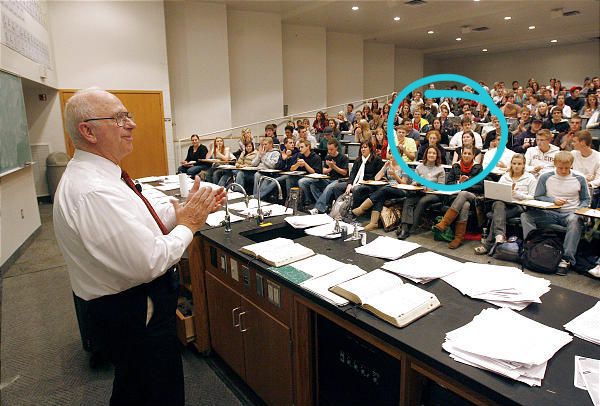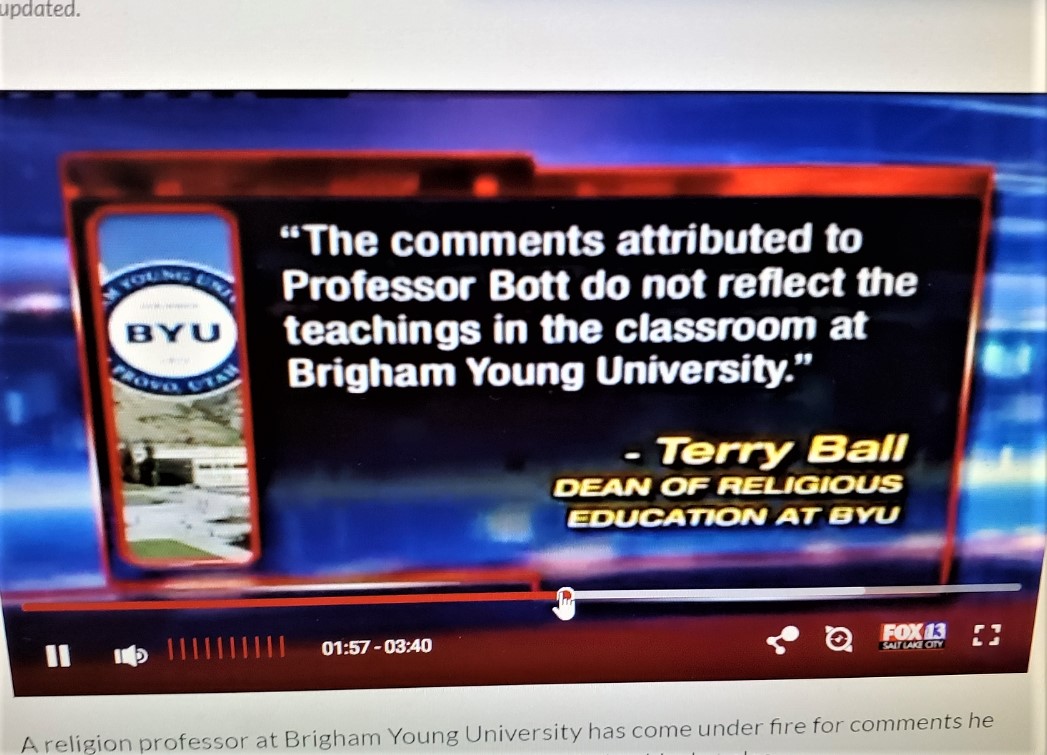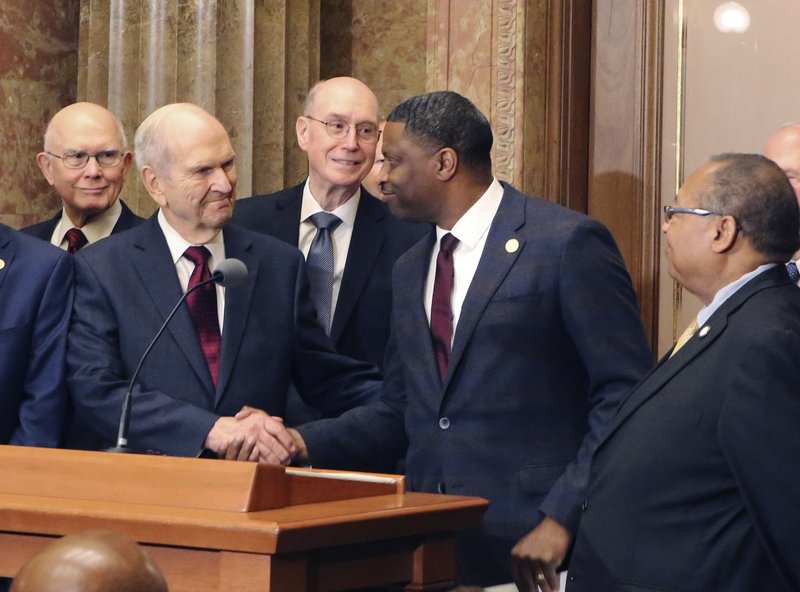***Update on Tuesday, January 21st, 2020***
I’ve had an immense amount of feedback on this blog post that went live 24 hours ago, all of which I am truly appreciative of. Thank you everyone for your thoughtful remarks and calls to move this discussion forward, and I understand the frustrated tone of some who felt I’d missed the mark. Based on what I have heard, I decided to edit this post and respond to these comments.
1. I originally put the photos of four prominent Latter-day Saint black women as the main image. I didn’t mean to imply that they were somehow involved with the post at all. I simply wanted to share women who had been a great resource to me personally, because I live in a place (Utah county) that doesn’t provide me very regular companionship with black women. I have appreciated so much hearing about their lives and perspectives in books, social media posts, podcasts, and even movies. I wanted to share them as good examples, before I told a story about a white man’s racist teachings (who I was also providing ample links to news articles and resources about). I wanted to include the names and information of black women who I respected, and put them at the very top as a way to have them come before the rest of the story. I understand that this was not how they were received, and the last thing I want to do is miscommunicate my admiration for these women, so I’ve replaced it with a stock photo of BYU.
2. I wrote about my fondness for Brother Bott and his class from the perspective of my younger self, when I accepted everything he said without a second thought. I want to clarify that I have changed my feelings dramatically in the past two decades, and after hearing more stories yesterday (especially one of a young woman who did try to raise concerns about him up the chain of command a few years before I was there, but was shut down repeatedly), any lingering feelings of compassion for Randy Bott and his becoming the church’s scapegoat have diminished significantly.
3. Finally, I want to clarify that while I do hold the church and those with authority to write and preach doctrine to the entire church to a higher standard than a BYU professor, Randy Bott should not be excused from his racism simply because he wasn’t forced to stop teaching it by anyone at church headquarters. Knowing that at least one brave woman in the nineties tried to stop him with no success reminds me that just because I didn’t see anyone censuring him doesn’t mean that no one did. (And those who did took on great personal risk and stress to do so.) Randy Bott is responsible for what he said. It doesn’t matter that he had been taught incorrectly, that he hadn’t been forced to stop, or that it was well received. It was still wrong, and he was wrong. Strangely enough, I was worried about not being hard enough on myself for accepting racist teachings as a young person, but then felt like it was unfair to lay total blame at Randy Bott’s feet for his own teachings as an adult and former mission president. But we were both wrong – him for teaching it, and me for listening and agreeing. I sincerely don’t want to be that blindly obedient teenage girl anymore, but if I am holding myself accountable, I should hold him accountable as well. And he should actually be much more accountable than the teenagers in his class, because he was a person with standing in the community and relative power as the instructor. Randy Bott was aware of what he was teaching and sending off to the rest of the world in the form of thousands of missionaries, and nothing excuses his errors in judgement, especially when they persisted for decades.
I acknowledge where I was wrong, and I’m grateful for the opportunity to re-think these things. I welcome any and all feedback. Below I have left my original post intact, so that the comments left in response to what I said don’t seem out of place, and so that hopefully others can learn from the same process I have.
January 20th, 2020
I started at Brigham Young University in the fall of 1999, just before the turn of the century. As a new freshman at a church owned university, only one thing captivated my attention and passion as much as freshman boys – and that was the prospect of serving a mission. I’d decided at age 16 that I would serve, and from that moment forward I listened to every talk and motivational speech directed at the young men as if it was meant for me, too. (As a side note to this story, I didn’t serve a mission after all. I was dating my husband at age 21 and got married instead.)
But at age 18, I didn’t know that future yet. Instead, I watched boy after boy in my freshman ward open his mission call in the lobby of our dorms (with his family on speaker phone from wherever they lived). On Sunday nights I would also go to something called “Tunnel Singing”, where students would gather at 9 pm under a bridge near the Marriott Center to sing hymns together. About halfway through the singing, they’d take a break and let everyone who’d received a mission call during that week announce where they were going and when they reported to the MTC. After cheers and applause, we’d sing a rousing version of “Called To Serve”, and I was almost always choking back tears by the end because it felt so amazing to be a part of something so special. It was almost always teenage boys announcing their calls back then (and I was jealous), but every once in awhile a 21 year old sister would announce hers. When she would do that my chest would burn with love and respect for her, and all I could think about was how badly I wanted to be exactly like her. I could not wait to turn 21.
At the beginning of my sophomore year (at age 19), I decided to attend the wildly popular Missionary Prep class taught by Brother Randy Bott. It felt like every boy from my freshman ward had taken that class, and I’d attended a couple times the year before just to see what it was like. And for Teenage Abby, it was AMAZING. It was the best class I had ever been to at BYU. The instructor was funny, passionate, extremely knowledgeable, and his classes were packed. Every seat was taken plus standing room next to the walls sometimes. I clearly wasn’t the only one attending the class who wasn’t officially registered for it.
I went to every single class that fall semester, even though I wasn’t getting credit for it. I was on the edge of my seat and took comprehensive notes. I bought his book from the BYU bookstore. I tried to follow whatever he suggested in preparation for a mission. I didn’t even hate the lesson where he talked about girls not needing or being encouraged to go on missions, because I was sure it didn’t apply to me. The next semester I went ahead and signed up for the class for official credit and happily sat through every lecture a second time.
I loved that he would always open the floor for questions, and I remember specifically asking him once, “Could Jesus have been a woman? No one else could have done what he did, I know – but is “Savior of the World” a priesthood calling? Or could our savior have been a woman, if *she* had been the one who volunteered?” This was literally the only time Brother Bott disappointed me. He didn’t answer my question directly at all. Rather, he talked for a minute about the role of women and something else forgettable and then said, “Your real question is this, I assume – am I going to end up eternally pregnant having babies forever?” I remember thinking, “Wait, what? That was not my question AT ALL. Did you even listen? That’s literally the furthest thing I can think of from what my question actually was!” And then he quickly asked for the next question from the crowd without checking to see if I was satisfied with his response. I just shrugged internally and assumed it was too hard of a question and I’d stumped him (so score one for me!).
Other than that one puzzling moment, BYU Abby was never let down by this great professor. And on this Martin Luther King Jr. Day, I can also remember his lesson on race and the priesthood very well. For those who are not familiar with Randy Bott (or his very public ordeal over his teachings about race), let me fill you in on what he taught.
I sat in his classroom (I still remember where I was sitting that day, and which chalkboard he was writing on) and watched Brother Bott draw a ladder on the board.

Brother Bott explained that not giving black men the priesthood before 1978 was a kindness to them. “If you climb to the top rung of a ladder and fall off, you’ll get hurt very badly. However, if you climb only a step on the bottom and fall off, it’s not nearly as bad.” He animated the climbing and falling with his hands in front of the board. “Black people were not ready for the priesthood before 1978 because of centuries of slavery, lack of education, racism, etc, and thus they were allowed to only climb the first rung – by getting baptized into the church. If God had let them climb all the way to the top with full priesthood ordination and temple endowments before they were prepared, they could have fallen all the way down to become Sons of Perdition.”
I internally shrugged my shoulders again and thought, “Okay, sure. That makes sense.” I sat through this lesson twice, once each semester.
That might’ve been the last of it for me, but over a decade later in 2012 his teachings suddenly hit national news when Mitt Romny was running for president. A Washington Post journalist interviewed Brother Bott and asked for an explanation about the priesthood ban on blacks. Here is an excerpt from that article, (which you can view in whole here):
“God has always been discriminatory” when it comes to whom he grants the authority of the priesthood, says Bott, the BYU theologian. He quotes Mormon scripture that states that the Lord gives to people “all that he seeth fit.” Bott compares blacks with a young child prematurely asking for the keys to her father’s car, and explains that similarly until 1978, the Lord determined that blacks were not yet ready for the priesthood.
What is discrimination?” Bott asks. “I think that is keeping something from somebody that would be a benefit for them, right? But what if it wouldn’t have been a benefit to them?” Bott says that the denial of the priesthood to blacks on Earth — although not in the afterlife — protected them from the lowest rungs of hell reserved for people who abuse their priesthood powers. “You couldn’t fall off the top of the ladder, because you weren’t on the top of the ladder. So, in reality the blacks not having the priesthood was the greatest blessing God could give them.”
These comments stirred up quite the controversy, with online outrage abounding, and students even planning small protests.
In response Terry Bell, the Dean of Religious Education at BYU said, “The comments attributed to Professor Bott do not reflect the teachings in the classroom at Brigham Young University.” (Which CLEARLY was not true – I heard them taught more than once to a packed crowd of students with my own two ears!)

Brother Bott quietly retired from BYU to serve a mission shortly after this all happened, and the church also issued a statement:
“”The positions attributed to BYU professor Randy Bott in a recent Washington Post article absolutely do not represent the teachings and doctrines of The Church of Jesus Christ of Latter-day Saints,” the statement said. “BYU faculty members do not speak for the Church. It is unfortunate that the Church was not given a chance to respond to what others said. “The Church’s position is clear — we believe all people are God’s children and are equal in His eyes and in the Church. We do not tolerate racism in any form.”
In an interesting turn of events, my longtime friend, neighbor, and soon-to-be-bishop of my ward, turned out to be Brother Bott’s nephew. Somehow in all the years we’d known each other I hadn’t made that connection until this news story. My husband asked him about it at church in Elder’s Quorum, and the nephew had just shook his head a little and said, “Oh, Uncle Randy shouldn’t have said all of that – he knows better.”
I thought, really? Did he know better? Because I didn’t know better. Nobody in that class that I sat through twice at BYU objected to him teaching it to us. He taught it to THOUSANDS of students, and nobody took complaints to the head of his department and made him stop teaching it. Brother Bott was not some unknown teacher that nobody had ever heard about. He was a campus wide superstar! (For proof that I’m not exaggerating, go watch the first fifteen seconds of this very funny, very viral Divine Comedy sketch here (made by the same people who would later create the popular Studio C program). The song is a parody of “California Girls” by Katy Perry and the very first line says, “I know a place…where we’ve got way different celebrities…”, and they flash a picture of Dieter Uchtdorf and then of RANDY BOTT. Those two guys were about equally popular during his heyday at the university.)
For even more evidence, here is a Randy Bott praise-filled news article from the Deseret News article in 2008.
At one point, he was the most popular professor in the country on the website RateMyProfessor.com.
Everybody used Randy Bott as a scapegoat, and yes, his teachings were totally racist. But somehow I don’t think it was fair to throw someone with zero authority under the bus when he was only repeating what he’d also been taught his entire life. Had anyone with authority ever attempted to correct what he was teaching? From this outsider’s perspective, it doesn’t appear that anyone did.
I wish we could say now that these racist ideas are finally behind us in 2020. However, just last year my 12 year old son came home from church and said, “Mom! My teacher said something today that sounded so racist. She said that black people came from Cain and Abel. Because like, Cain killed Abel, so God cursed him with black skin – and that’s where black people come from. I couldn’t believe she was seriously telling us that, but she was!”. He couldn’t stop laughing about how absurd it all sounded to him, and repeated it over and over again to my husband and I.
First, I was so secretly thrilled that my kid was laughing at the ridiculousness of something so obviously wrong, since I had heard those things growing up and never thought twice about them. But secondly, I was annoyed that this stuff was still happening, and I didn’t even know what could be done about it. His teacher was a very friendly and outgoing woman in the ward, and she’d just recently been in the Relief Society presidency. What should we do? My husband decided he wanted to talk to the bishop about what happened, and made an appointment (with the same bishop who is Randy Bott’s nephew, coincidentally!). He did, and the bishop agreed to discuss the issue with the teacher. He reported back to my husband that she’d apologized and said she was just trying to keep the class interesting for the kids. (I don’t know if a correction was ever made in class or not, but my son never reported hearing one.)
I get it. It’s hard to keep kids focused and learning without teaching new and unique things they haven’t heard before. I don’t blame her. And honestly – again, like Brother Bott – she was teaching things SHE had been taught by her favorite teachers at church for decades. She is extremely active in the ward, loves learning, and centers her life on the gospel – and yet for all of her participation she’d missed any announcement from the church that that teaching was outdated and racist.
Is it Randy Bott’s fault or my son’s primary teacher’s fault that these errors persist- or is it the fault of church leadership failing us? If such a prominent and vocal member of the church as Randy Bott missed the memo, is it any surprise that a white primary teacher in one of the whitest wards in the church missed it as well? We have no control over what happens at the top, but what are we doing as a church community (especially white people, like myself) to fix these problems? And what if the first question asked of us on the other side isn’t “Did you ever dress immodestly or try alcohol?”, but rather, “Did you do anything to stop racism in your community?”
I hope that next time my son hears racist teachings he stands up and objects, rather than just coming home and laughing about it afterwards. And I hope I never absorb a racist idea ever again, just because of the trust I have in the source its coming from. Happy Martin Luther King Jr. Day, and here’s to a better future for all of us, together.








17 Responses
Abby thank you for this deeply introspective and thoughtful post. We have to do a better job at separating our human prejudices from divine truth. It’s uncomfortable to realize the lies we carry as truths. And even harder to change our thinking. But this kind of growth is essential. So glad to start off MLK day with this reminder that I have work to do.
I feel so uncomfortable with the casual way you talked about your son laughing at something he identified as racist. Like no- we don’t just “hope” our kids will stop thinking racism is funny. We shut that DOWN immediately, swiftly, and decisively.
I appreciated the article but honestly your casual mentioning your own son thinking racism is funny more than once ruined the whole thing. It’s actually horrifoc.
Perhaps I should have been more clear – he was laughing at how ridiculous it sounded to him that anyone could just believe God made people black as their punishment for something – and the absurdity that his teacher was actually telling it to the class like it was a normal, interesting fact. I don’t believe he thinks racism is funny – he thought it was weird that a grown adult would teach that to anyone with complete seriousness.
Also, him being an elementary school student in his primary class was a very different power dynamic than say, myself and another adult discussing it. I’ve seen countless grown ups too uncomfortable to raise their hand in class and question what a more knowledgeable instructor was teaching as a fact – especially if no one else seemed to be objecting.
The fact that my son did nothing in the moment but came home and couldn’t stop laughing about how bizarre the whole thing was – as a child – gives me a lot of hope that his generation will be well prepared to take down racism as they reach maturity.
I remember hearing that Bott was the most popular teacher on Rate My Professor many times during my freshman orientation, and I took his mission prep class the last semester he taught. The Washington Post article came out in February and about a week after he announced that he was retiring to go on a mission and that it had absolutely nothing to do with the article and it had always been the plan. It was such a blatant lie that I lost any remaining good feelings for him. I had another friend who also hated him but was a better student than me so she would send me the notes on the days I couldn’t handle going to class.
One of the classes I do remember is when he told everyone that if they had “messed up” before marriage, but repented then they shouldn’t tell their spouse, since it would just upset them. I don’t know if I can completely articulate why it bothered me so much, but it seems deceptive. (And to be clear I definitely don’t believe that sex makes someone broken or unworthy!)
The hateful rhetoric spewed by this utterly rotten man is despicable and inexcusable. This piece is confusing to me because I can’t tell if you’re speaking about him with apologetics and admiration, or the naiveté of an ignorant college girl who hadn’t begun to address her own internalized racial biases, and so hearing the racist folk doctrine did not seem jarring to your worldview. You give us ample example of how you believed what he taught you as a young person, but you don’t give us enough evidence to show how your thinking has evolved since then. What are you doing to denounce the racist things you heard and once believed, or accepted as truth? Things like what your son heard at primary. Why is it still happening in 2020? Because not enough work has been done to denounce the old folk doctrines still floating around, and any BYU grad who took this awful class who is now a Primary teacher might be the next one to keep turning it over and passing it on. The fact that you’re annoyed that “this stuff was still happening” makes me think maybe you’re not paying attention or actively talking about anti-racist principles with the people teaching your children.
This part of your piece, though I absolutely disagree with: “But somehow I don’t think it was fair to throw someone with zero authority under the bus when he was only repeating what he’d also been taught his entire life.”
No. Absolutely not. If you’re trying to show how BYU or the Church at large are accountable for the perpetuation of racist rhetoric, make that (very true and very good) point on it’s own. But do not justify, minimize or explain away one person’s horrific actions like this. Arguments that contain things like “but he was just a product of his time” or “he didn’t know any better” or “he was just repeating what he’d been taught” are phrases that serve to give someone a pass on the injustices they commit. He had authority: he was given license to mold young adult minds into whatever information he wanted to feed them. This statement of yours sounds like you’re giving him an excuse.
Zandra Vranes just posted about this idea of judging people of the past by today’s standards. She writes, “The difference between an abolitionist and a colonizer in the past is simply that one found an excuse. The difference between being racist and anti-racist today is that one is giving excuses and the other is dismantling them. Repeat after me, “Oppression, marginalization, and discrimination is wrong, it is wrong today, it was wrong yesterday, and it will still be wrong tomorrow.””
We absolutely cannot shift the blame from this racist man onto the institution that enabled him. He is absolutely culpable, and so is the institution that produced and employed him. Do not give individual racists a pass because they’re products of institutional racism. It is wrong, wrong, wrong in every context.
Also, I have strong criticisms for the use of the image of these Black women as cover faces for a post that mostly serves to broadcast hateful and racist rhetoric spoken by a bigot. You did not quote them, you did not ask their permission to be associated with a post about the awful words of a racist man. Using their faces on a post about the racist machinations of a white guy is reducing their images to click bait, and you should not have done it. A post that uses the images of these wise Black LDS women should be a post about WISE BLACK LDS WOMEN. You’re not advertising their words, ideas or platforms by using their images in this way, you’re commodifying their bodies, and that is not ok.
Thank you. These points are really important, and I think right.
He doesn’t get a pass.
So, what this professor was teaching was wrong and I really really wish somebody in his class had said something. I can’t imagine how it would feel to be a minority sitting in there and hearing that.
However, I don’t know if I would’ve been brave enough to speak out as a college student. I still remember an excellent history professor at BYU putting a paragraph from a book up on the board—without telling us what book it was from. The paragraph talked about keeping bloodlines pure etc. (you know, racist crap). Our church has an awful history of prophets saying things like this, and I’m pretty sure this professor visiting from Cambridge wanted to get us to think. Anyway, the words made me feel uncomfortable and were not biologically sound (i.e. it implied that different races mixing was like mixing of different species. That’s dumb because we are all the same species). But the class was large and I am shy. So I just waited for somebody else to point out that this was wrong. Nobody did. In fact, one student even declared his support for the ideas.
Then our professor revealed that the article was taken from Mein Kampf and had been penned by Hitler. Ouch! Nobody in the class of sheep (of which I was a part of) had been aware and brave enough to disagree with something the teacher put up on the board.
I’ve been thinking about this experience a lot lately. It was probably twelve or thirteen years ago but it had a huge impact. Why couldn’t I speak up? In part it’s just my nature to be quiet in groups. But I knew even at the time that the words were wrong. Honestly, this one lesson from BYU was the most memorable I had. It’s changed me a lot in how I speak in church (I teach primary) and definitely in how I’m raising my kids. I may not have had the maturity as an 18 year old to speak out when I saw evil, but I can do it now.
I must say this was a very confusing and troubling post. But perhaps not for the reasons intended. I had assumed, given the images chosen, it would be about these women. Which it’s not. Even the image caption rubs the wrong way, like, “You likely haven’t even HEARD of these people, let me be the one to introduce them to you by telling you to google them instead of actually writing an article about them.”
I think the intention was good, but the tone with which this important topic was treated felt very off, and ended up sounding like someone trying to share an amusing anecdote about college days rather than addressing this deeply hurtful, urgently relevant tangle of issues.
This piece is uncomfortable at best and I have harsh criticisms that I’m trying to keep in check. Part of fighting systemic oppression is calling it out and I understand you were young when you took his class but you are also not exempt from the racist rhetoric that was said in that class. I’m appalled that even in 1999, you and other students didn’t see how harmful his teachings were? That wasn’t a long time ago and I agree with the above comment that you’re making excuses for him. What he taught to thousands of students can’t be undone AND it sounds like a lot of it was false.
Don’t use a post like this to draw in people of color- especially ones that have been hurt by the church by its teachings. Don’t use MLK Day as an excuse to write about memories that clearly show how racist your institution was (is) and expect people to sympathize.
I must say that I am kind of surprised by the harshness of the criticism. Not that you are not correct, just that you are not very kind.
First off, I am not trying to defend the author who is probably not fully aware of her own prejudices. But there is a learning curve here and while she is probably not as far along as you wish all white people were, beating up on her is not a good way to teach. Unless you want to teach her that people of color are nasty mean people and that they and their allies can be cruel.
Part of the problem in racism is that whites don’t know what is offensive so they just shun people of color. Out of fear they will offend. By correcting someone this harshly, you have just reinforced the whole problem. She will just avoid this kind of discussion, and this kind of discussion is the best way to start to teach what is and what is not racist
I grew up in Provo Ut at a time when there were no blacks, so the poor white trash were the ones who got the brunt of discrimination. I was the poor white trash. Luckily my mother had lived on the poor side of Salt Lake City and gotten to be friends with some blacks and she taught me not to look down on anyone the way we were looked down on for being poor. But I had no idea how to act around blacks. When my husband and I moved to Mississippi, I found friends who were tolerant of my ignorance. They very gently and lovingly taught me, rather than getting all huffy on me. Did they owe it to a stupid white girl to teach me about racism? No. They had every right to be offended at my ignorant but trying self. But they saw someone who was trying.
So, that was what I saw in this post. She started out living in an environment where racism was normal. She is willing to confess that for a long time, she didn’t see what was wrong with what was taught, probably just like Randy Bott. But she learned and now she is proud that she didn’t pass the racism she was raised in onto her son. His reaction to racism is to find it so strange as to be funny. Should she have sat him down and explained that it is not funny, and that the teacher is ignorant of how unkind she is being? Yup. Should she have recognized what prof Bott was teaching as racist garbage? Not if she had never been exposed to anything different.
And do you have any idea of the reaction when a student tries to correct a college professor in class? I did it once and thought that being as I was his prize pupil, and I had the text open to where it said he was wrong, and gave him the page number, that he would accept it as a correction. But he acted angry and insisted he was right, and the class acted horrified about my inappropriate behavior. Nope. Won’t do that again under any circumstances.
At least the opening post was brave enough to start this conversation and I applaud her for that. It has been an educational experience for me too and as much as I see the need for more conversations of this nature, I sure won’t be opening myself up to a hatchet job by starting one.
Thank you for this.
Anon, there are a few points to this comment that I’d like to address. I can see that you’re identifying with the author as a recipient of criticism and that in your estimation, the feedback delivered to her was done in a harsh way. Labeling the criticism she received as “too harsh” is a function of tone policing the feedback almost to the dismissal of the content. I see your concern that upon her receiving difficult feedback, you postulate that she may no longer wish to engage in discussions like these after being corrected. My first question to you is this: why do you choose to identify with the author who has admitted her missteps and offered correction instead of with the people of color who were most impacted by her words?
The point you make about the feedback she received leading her to disengage from anti-racist work is problematic because it functions as a way to prioritize her comfort (or any white person’s comfort) at the expense of those who may have actually been harmed by the original words. This is an example of a way that we need to put aside tendencies of “White feminism” in favor of a more intersectional approach to our words and comments here. As it turns out, receiving feedback about one’s approach does not shut down growth or discussion, it pivots the angle of the conversation in a different, and hopefully improved direction. When white folks engage in anti-racist work, feedback and discomfort are an important part of the process, as is taking the cues of PoC who point out problems. Centering the feelings of white folks in conversations about race exacerbates the fragility, and that is something we try not to do.
Ongoing conversations about race relations and our aspirations of building an intersectional space that doesn’t prioritize white feminism is something the Exponent blog is actively pursuing. Missteps may be part of that process, and further correction, and the internalizing of principles to avoid it happening again.
I wrote about ways that white women can leave behind White Feminism in pursuit of a more intersectional activism in this post from last week. You may find some of the suggestions and resources helpful.
https://www.the-exponent.com/toward-intersectionality-censuring-white-mormon-feminism/
maybe it is policing tone to say I don’t like seeing someone kicked in the teeth for sharing their best effort to understand something. But I STILL don’t like seeing someone kicked in the teeth for trying even if the kicker is a person of color and didn’t think the efforts were good enough. I am out of the church because my best efforts were never good enough, and if intersectionality is all about whites best efforts never being good enough, then I guess you can count me out. I want to know that my best effort won’t be punished.
Let me put this another way, if my knowledge of all things intersectional has to be perfect before I join the conversation, then I won’t join the conversation because I know my own understanding is not perfect. In fact, I was probably reacting to my own fear that I might accidentally offend and I really don’t need to have three people all harshly criticizing me for doing my best to engage in the whole conversation
Sorry to keep coming back to this, but I have been thinking and I don’t think I am policing tome, so much as saying some people are angry at the wrong person.
My gut reaction is to defend the original poster, but it isn’t because I feel anyone is too angry. But it is like a conversation I had years ago when Clinton was being impeached. The person was furious at Monica for not telling Bill Clinton to go to hell when he tried to manipulate her into sex. I tried to explain the power differential but it was no use and I just got accused of defending the slut.
This felt the same. People are angry at a student for not standing up to her professor and I try to explain the power differential. What if Randy Bott was a different kind of jerk and tried to manipulate her into sex. Y’all would be jumping to her defense. But since it was racism he was trying to manipulate her into, she is just as guilty as he is? Sorry, but I still don’t think so.
I think where the anger belongs in on Randy Bott, but mostly on the church that taught him bigotry and called it doctrine. The real anger belongs on the church top leaders who taught crap for years and still refuse to take responsibility for their own behavior and the behavior of the men who came before them. That is why I am reflexively trying to defend the original poster, because the anger should be placed on the church leaders who taught crap, not someone caught in a power differential who didn’t know how to handle a professor teaching crap. Or even failed to recognize it as crap.
But I couldn’t even think that at first, let alone say it because it hurts to say my church that I love is not perfect and sometimes it isn’t even good. To put all the anger on the church rips me in half, so I understand why it is easier to put the anger on someone else, but I still don’t feel it belongs there.
I stand all amazed at the grace contained in Abby Hansen’s response to the comments on her original post. As a writer, I understand that a harsh editor is my best friend. But as a human being, I resist correction, blame others, and lash back. Abby’s response is a lesson to me about grace under fire. It is why I return to this site time and again for wisdom.
[…] BYU, Randy Bott, and Racism by Abby […]